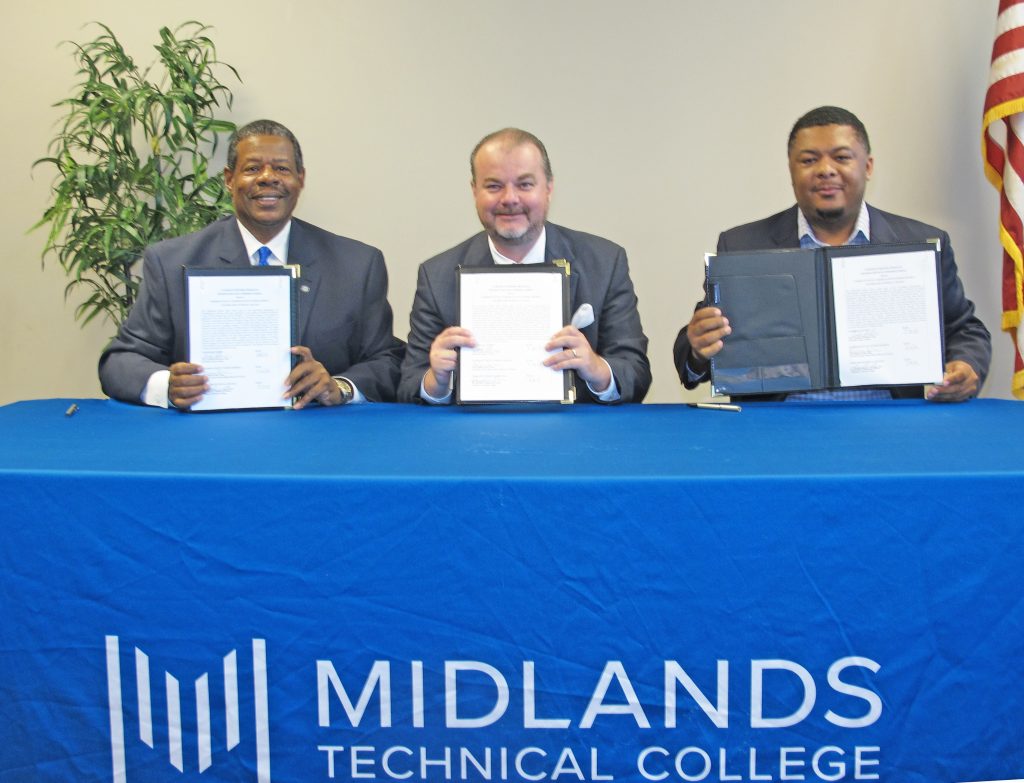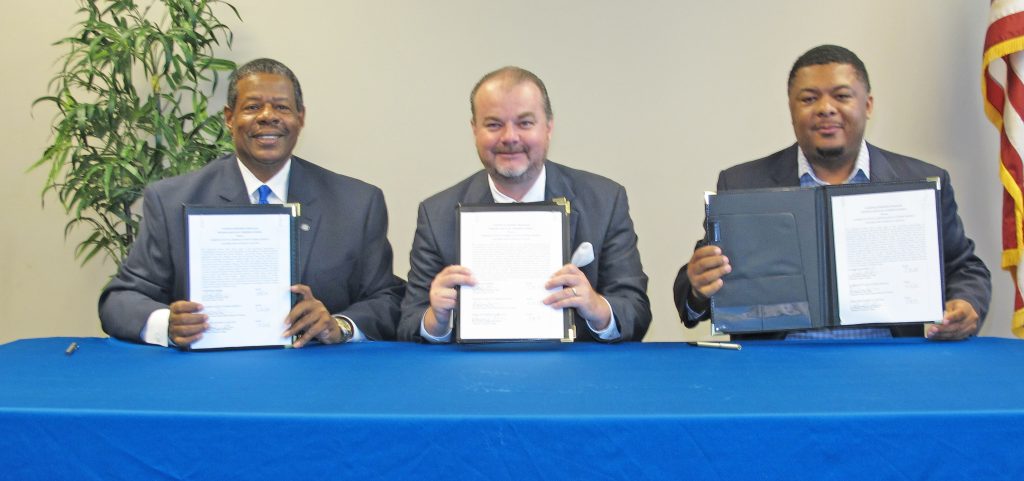
A memorandum of understanding to create a Promise Program was signed Monday by Midlands Tech President Ron Rhames, Fairfield County School Board Chair William Frick and County Council Chair Cornelius Robinson. | Barbara Ball
WINNSBORO – Providing free technical college tuition to financially struggling students is noble. Supporters say the Fairfield County taxpayer-funded Promise Program initiative will open college to more students and boost the local workforce.
On Monday, representatives from Fairfield County, the Fairfield County School District and Midlands Technical College inked a Memorandum of Understanding (MOU), pledging their commitment to the Promise initiative.
“This is a wonderful program and a way to move our county forward,” County Administrator Jason Taylor said to those gathered at the signing. “A good education is one of the surest ways to guarantee that our children will have access to good jobs and the opportunity for a better future.”
Later that night, Fairfield County Council discussed in public, and also behind closed doors, its role in the Promise Program, recently pitched by Dr. J.R. Green, district superintendent.
“Any kid in Fairfield County could go to Midlands Technical Institute at no cost,” Green said. “Students have to apply for financial aid. They’ll look at all the federal and state aid, and Promise revenue will cover the difference. But no one will be required to pay any tuition.”
Similar programs exist in Kershaw, Sumter, Lee, Green wood, Clarendon and Williamsburg counties, according to the S.C. Technical College System, which governs the state’s technical schools.
Most counties make free tuition available, but not unconditionally. The only conditions of note in the Fairfield MOU are that recipients must live in Fairfield County and graduate from a public or private school, approved homeschool or have a GED.
Greenwood prorates tuition aid based on a student’s length of residency, according to the Greenwood Promise Program website.
Sixty-five percent aid is offered to students attending grades 9-12, but students attending two years or less receive nothing. Full aid only goes to lifetime residents.
In Sumter County, qualifying students can attend Central Carolina Technical College at no cost provided they maintain a 2.0 GPA and remain enrolled for six consecutive semesters, according to the CCTC website.
Aid only covers tuition, however. Books, lab fees and other miscellaneous costs aren’t covered, the website states. What the funding covers is not made clear in the Fairfield Promise MOU.
Promise creates confusion
There’s some disparity between how some council members, the school district and MTC perceive the Promise Program arrangement.
The MOU signed Monday describes the deal as a “nonbinding Memorandum of Understanding to announce their intent and purpose to work together to establish the Fairfield County Promise Program.”
An MTC media advisory announcing the signing states that dignitaries “will sign an agreement that allows 2019 high school and GED graduates living in Fairfield County to attend MTC at no cost.”
Both the school district and county have budgeted $75,000 for the Promise Program, but neither body has formally voted to authorize any expenditures for the program, though approval is likely.
At Monday’s council meeting, Councilman Jimmy Ray Douglas repeated prior assertions that MTC doesn’t attract enough students to its Winnsboro campus to justify holding classes there.
“I’m not against educating children, I’m all for it,” Douglas said. “I’ve been trying to get Midlands Tech to teach classes in the last five years, yet they’ve had no classes whatsoever. It’s a shame we have to pay them $75,000 to start a class.”
Speaking to The Voice on Tuesday, Councilman Douglas Pauley identified several elements that concern him, namely cost and accountability.
Pauley said MTC needs to more clearly state how many students plan to attend and what classes will be offered. He said county’s $75,000 share should be doled out in quarterly installments based on MTC’s ability to meet those standards.
“To give a lump sum of money with no accountability to the taxpayers how that $75,000 is specifically going to be used, I’m not in favor of that,” he said.
In addition, Pauley said students should be required to take more classes than the six-credit-hour minimum he said other council members support.
Many traditional student loan programs require students to register for at least 12 credit hours to receive full financial aid.
Pauley also said students should meet specific academic standards to qualify.
“To me, with a C average, you’re just kind of coasting along,” he said. “If someone else is paying for your college tuition, you can do better than a C average.”
Other council members embraced the Promise Program.
“This is a huge deal to be able to allow our students to go to school tuition free,” Councilman Moses Bell said. “This is big, this is a good thing. This is something we ought to be jumping up and shouting about.”
Council Chairman Neil Robinson also supports the Promise Program.
“I just think investing in our future for the kids is definitely something that’s needed in this county so we can have a stronger workforce, a better quality of life,” he said. “We’d be bridging that gap for the workforce.”
Robinson said the Promise Program would likely receive further discussion at the next meeting set for July 22.
Transparency concerns
Government secrecy is also throwing cold water on the initiative for some.
On Monday night, council members retreated behind closed doors to further discuss the Promise Program. Ridgeway resident Randy Bright chided the council for doing so.
“You’ve taken a slip back with this Promise Program. There’s lots of confusion, lots of secrecy,” Bright said during public comments. “Why are you talking about this in executive session? This is between governments. You shouldn’t need to talk about this in executive session. It should be open.”
An agenda for the meeting stated the executive session was for a “contractual matter” to discuss and receive “legal advice regarding [an] agreement between Fairfield County, Fairfield County School District and Midlands Technical College as to the Promise Program.”
Pauley said he didn’t agree with discussing the Promise Program behind closed doors.
“I thought that matter pertaining to the Promise Program could’ve been done in an open forum,” he said. “I didn’t see a need for it to be in executive session.”
Monday night’s executive session was improper because the county had already signed an MOU, said Jay Bender, an attorney with the S.C. Press Association, of which The Voice is a member.
Bender also called the receipt of legal advice explanation “vaguely worded.”
“The MOU sounds like a contract to me,” Bender said. “If there’s an MOU, which is a contract, you can’t go into executive session under the rubric of contractual matters.”

